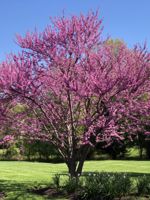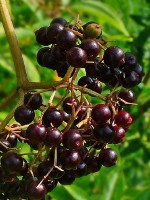Mon-Fri 9am - 5pm Mountain time
Eastern Redbud vs Ranch Elderberry
Cercis canadensis
Sambucus canadensis Ranch
NOT AVAILABLE THIS SEASON - MIGHT RETURN
The Eastern Redbud is known for the pea-like pink buds that emerge in clusters on the bark, embellishing the tree in stunning flowers. They have a longer bloom time, sometimes for two to three weeks before the heart-shaped leaves emerge for the summer. Inedible pods emerge that turn brown in the summer, this tree is a part of the bean family.
Native to the Eastern North America. The Eastern Redbud can tolerate acidic and alkaline soil. Plant this as a beautiful understory species or shaded residential yard or garden. The bright pop of color will make an attractive ornamental tree.
Ranch Elderberry is a vigorous and high-yielding Black Elderberry cultivar. It ripens earlier than other varieties and is smaller and more compact making berry harvest easier. The berries are well-suited for baked goods, jams, jellies, and syrups. They are high in vitamin C and reported to be beneficial for the immune system.
Black Elderberries are considered to be partially self-pollinating. So while they will still produce some berries without cross-pollination, planting with another variety will increase yields. Consider planting with Black Elderberry or Bob Gordon Elderberry.
Warning: the seeds, stems, leaves, roots, and uncooked berries are toxic to humans when eaten in quantity. Berries should be cooked to make them safe for human consumption.
Eastern Redbud Quick Facts
Ranch Elderberry Quick Facts
Toxicity: leaves, stems, and uncooked berries are poisonous to humans

